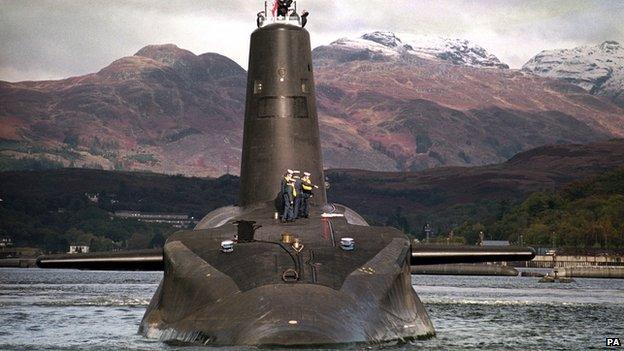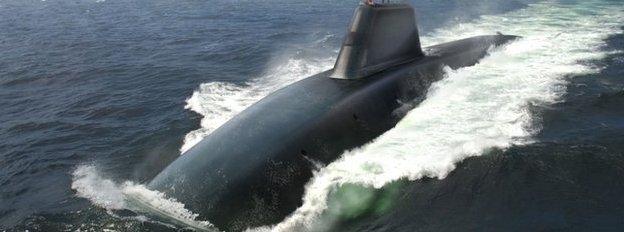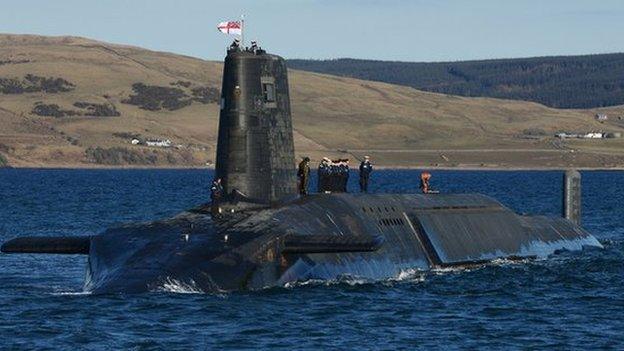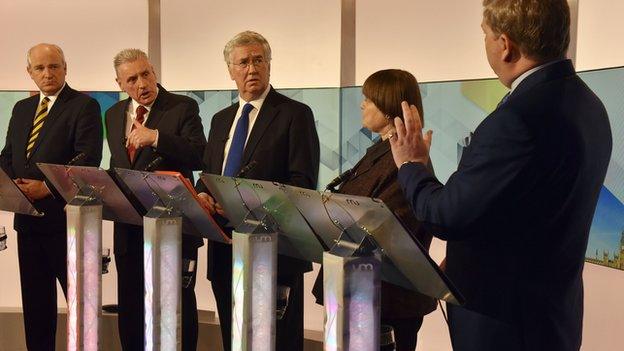Ex-military chiefs: Scrapping Trident nuclear subs 'irresponsible folly'
- Published

The UK currently has four Trident submarines which can carry nuclear missiles
A decision not to renew the UK's nuclear deterrent would be "irresponsible folly", a group of ex-senior military officials has said.
In a letter to The Times, external, 20 former defence chiefs said to "abandon" Britain's four Trident submarines would be "an enormous gamble" which could threaten "the survival of our nation".
Signatories include two retired defence secretaries and two ex-GCHQ directors.
A decision on whether to renew Trident is due to be taken in 2016.
On Tuesday, Labour's shadow defence secretary Vernon Coaker said his party was committed to renewing all four Trident submarines if it wins the election.
The Conservatives have also committed to renewing all four missile submarines, while the Liberal Democrats favour cutting to three.
The SNP, Plaid Cymru and the Greens want Trident to be scrapped. Scottish First Minister Nicola Sturgeon argued on Wednesday that Britain should strengthen its conventional armed forces instead of "obsessing" about nuclear weapons.
UKIP has said it would not scrap Trident, but would consider cutting back to three submarines.
'Irrevocable decision'
Among those to have signed the letter are former Labour defence secretaries Lord Hutton and Lord Robertson, the latter an ex-Nato chief, and retired chief of the general staff Gen Sir Mike Jackson.
Three previous heads of the armed forces, three ex-Royal Navy chiefs, and two former directors of government communications agency GCHQ are also among the signatories.

Analysis

An artist's impression of what the new Trident submarines would look like
By BBC defence correspondent Jonathan Beale
The list of those who've signed this letter is a who's who of those responsible for Britain's security over the past decade and they have a warning as apocalyptic as the weapon they now defend.
With the four submarines that carry the Trident missiles coming to the end of their life, they say any further delay in the decision to replace them will in effect end Britain's nuclear deterrent and ruin its credibility abroad.
Abandoning the deterrent would, they say, be an enormous gamble and an irresponsible folly.
Though both Labour and the Conservatives say they're committed to keeping it, there are fears that political deals, and the significant costs of replacing Trident - at least £25bn - could lead to further delays after the election.
The Coalition Government had already postponed the main decision to build the next generation of trident submarines until 2016.

The open letter addressed to "the incoming Prime Minister 2015" said a decision not to renew the fleet would "effectively end Britain's nuclear deterrent", and would be "irrevocable".
"To abandon Trident now and for good in the hope that no threat will emerge would be to take an enormous gamble on behalf of generations not yet born," they said.
"In an uncertain world where some powers are now displaying a worrying faith in nuclear weapons as an instrument of policy and influence, it would be irresponsible folly to abandon Britain's own independent deterrent."
The decision would affect "the security and ultimately the survival of our nation", they said.
The UK had made reductions in its nuclear arsenal proportionately greater than any other nuclear weapons power, which represented "a huge contribution towards nuclear disarmament", the letter said.
"We should stand ready to do more, but only if it can be proved that it does not compromise minimum levels of nuclear deterrence," it added.


- Published15 March 2015

- Published28 April 2015

- Published8 March 2015

- Published12 March 2015
